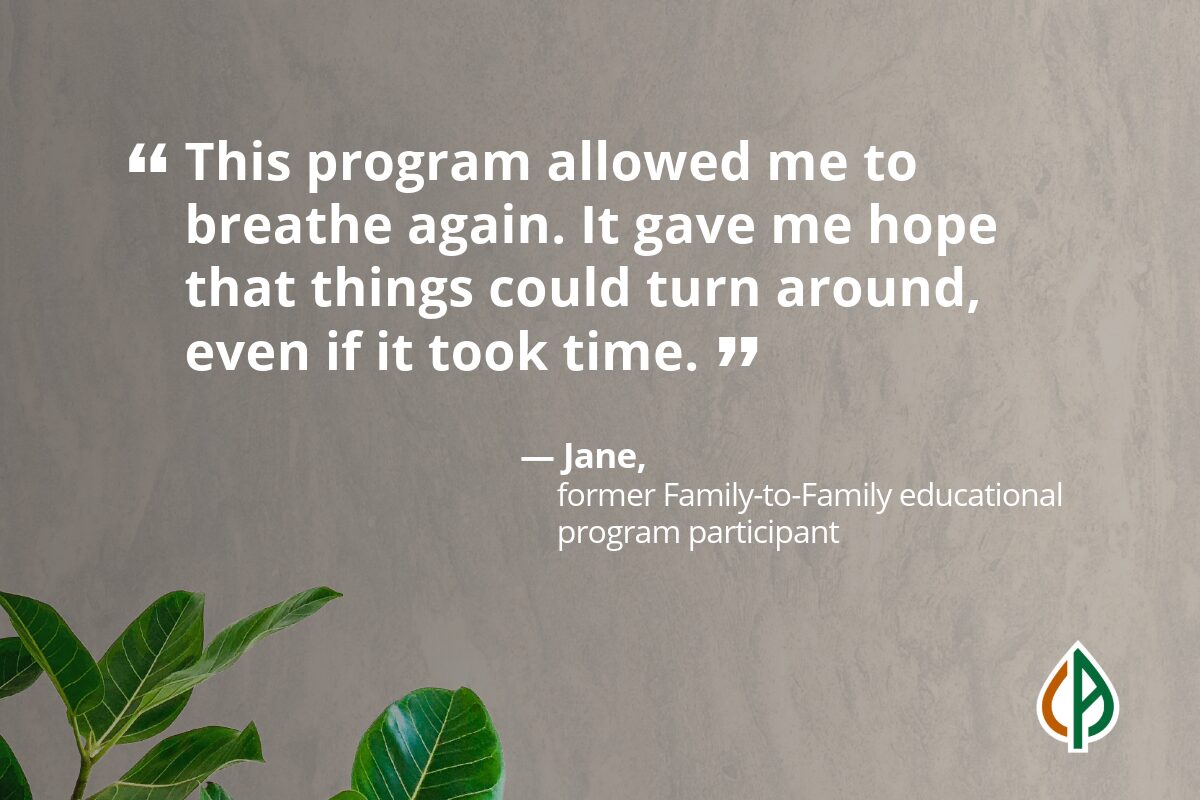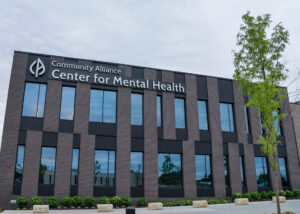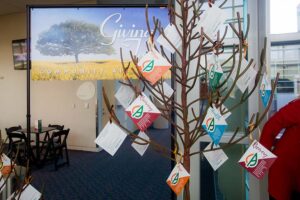How Community Alliance can support you during a loved one’s recovery

At Community Alliance, we are committed to providing families and friends with the help and support they need — and deserve — as they walk alongside a loved one living with mental health and substance use challenges. That’s why we offer a free, eight-week Family-to-Family educational program specifically designed for families, significant others and close friends to build connections, learn how to understand their loved ones, develop strategies for handling crises and more.
Since completing the program eight years ago, Jane has experienced a transformational shift in her relationship with her daughter, her sister and herself. She recently shared her story with Community Alliance to help others understand the profound impact of the program and how it continues to benefit her life today.
How did you first learn about Community Alliance’s Family-to-Family educational program?
I learned about the program from a friend. My daughter was having some issues, and my friend knew about the struggles we were facing. She suggested I reach out to Community Alliance for help, as she had used their services herself.
When we first visited the facility, we met with Dr. Jai Sookram, who manages the program. He put us at ease right away. After talking to him and learning about the Family-to-Family class, I realized that the program didn’t just focus on treating one person — it supported everyone connected to that person. That was an eye-opening moment for me.
Growing up, my older sister dealt with mental health issues and went through a lot of treatment. This program was different. It felt more forward-thinking than the mental health treatment I was familiar with.
Why did you join the program?
My daughter struggled for a long time with drugs, alcohol and self-destructive behavior. I started worrying about the long-term effects, especially since I had already seen my sister go through something similar. That’s when I knew we needed to address the situation and see if anything could be done to help her.
Dr. Jai saw my daughter a few times, and he quickly understood what was going on with her. It was incredible to feel like there was someone who could help us navigate this destructive phase in her life. We wanted her to find success and have a healthy lifestyle, not just drift along.
She eventually moved to Colorado and ended up incarcerated for various reasons. After her release, she was fortunate to find a supportive rehabilitation program in Denver. Through the relationships she formed in that program, she was able to turn her life around. She went back to school, graduated in December and now teaches art.
What was it like attending the Family-to-Family educational program?
I started the Family-to-Family class in January 2016, and it ran weekly until April. There was a real sense of camaraderie and shared experience among us. Even though everyone’s situation was different, we all needed guidance in helping our loved ones, whether they were family or friends.
The class provided emotional support, and it was reassuring to know that I wasn’t alone. There are many people out there dealing with loved ones who have issues, and sometimes you feel isolated when you don’t have someone to talk to.
In the program, what stood out as especially insightful or impactful to you?
The guiding force for me was hope. I couldn’t give up on my daughter. I needed to show her that I loved her, even though I didn’t approve of her actions. One of the big takeaways from the program was that you can help guide someone without enabling them, and that’s a delicate balance.
Another major realization spurred by the program was that if I didn’t take care of myself, I couldn’t be of any help to my daughter. At first, I thought self-care was selfish, but over time, I came to understand that it’s essential. The class also went into great depth about mental illness, which helped me relate to my sister’s struggles as well.
We learned crisis management techniques, like having a plan for recovery, relapse prevention and addressing safety concerns. I’ll always remember Dr. Jai saying, “Criticism is not therapy.” That stuck with me. The program taught us to accept people as they are, to be patient and to understand that change doesn’t happen overnight.
Since completing the program, in what ways have your life and relationships improved?
I’ve become more compassionate toward my sister. We talk much more than we did 10 years ago, even if the conversations aren’t always pleasant. But we’re closer than we’ve ever been.
As for my daughter, we talk every day, and our relationship is great. She knows I won’t always agree with her decisions, but she also understands that she’s in control of her life now. It took her longer than most to figure that out, but she’s finally there. I used to dread every phone call, worried it would bring bad news, but now I’m at peace with things.
The program reassured me that my daughter’s struggles weren’t my fault. We raised all our kids the same way, and they all turned out differently. Everyone has their own path, and all I can do is try to help them be healthy, contributing members of society. Now, my daughter is helping others, and that brings me so much joy.
What would you say to someone who is considering joining the program?
This program allowed me to breathe again. It gave me hope that things could turn around, even if it took time. I went back week after week because it reassured me that I was doing everything I could for my loved one.
I had so many sleepless nights, worrying about my daughter’s safety and well-being. But after each class, I was able to go home and rest, knowing that I was doing my best for her. If you’re considering joining, it’s worth it for the peace of mind alone.



